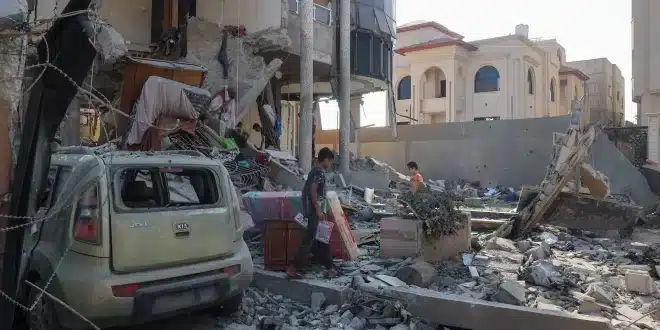Over 40,000 Palestinians have lost their lives in Gaza since Israel launched its war on Hamas following the group’s October 7 attack, according to the Gaza health ministry, marking another grim milestone in the ongoing conflict.
In the past 24 hours alone, 40 people were reported killed, bringing the total death toll since October 7 to 40,005—equivalent to roughly one in every 55 people in the enclave. Additionally, more than 92,401 have been injured.
The health ministry does not differentiate between combatants and civilians in its figures but claims that most of the casualties are women and children. Israel, on the other hand, stated last month that it has killed more than 17,000 combatants in Gaza since the war began. CNN has not been able to independently verify the ministry’s numbers.
Furthermore, at least 10,000 people are reported missing and are believed to be buried under the rubble, according to the Gaza government’s media office earlier this week.
These staggering figures highlight the ongoing daily suffering, malnutrition, and instability in Gaza after 10 months of intense conflict.
Philippe Lazzarini, Commissioner-General of the United Nations Relief and Works Agency for Palestine Refugees (UNRWA), described the situation as “a very grim milestone in full view of the world” on the social platform X, attributing it to “a collective failure to secure a ceasefire.”
This milestone comes at a particularly precarious moment in the conflict. A new round of ceasefire talks is set to begin Thursday, following the assassinations of key figures in Hamas and the Iranian-backed Lebanese militant group Hezbollah, which have destabilized both organizations and put negotiations at risk.
This news follows a particularly deadly weekend in the Gaza Strip. According to local officials, at least 93 Palestinians were killed overnight into Saturday when an Israeli strike hit a school and mosque in eastern Gaza City where displaced people were seeking shelter. The Israel Defense Forces (IDF) confirmed the strike, stating that it targeted a Hamas command and control center embedded in the building.
Israeli military officials have maintained that they strive to minimize civilian casualties in Gaza and blame Hamas for using civilians as “human shields.”
The IDF stated that “at least 19 Hamas and Islamic Jihad terrorists were eliminated” in the strike.
The attack has drawn widespread condemnation, even from some of Israel’s closest allies.
UN High Commissioner for Human Rights Volker Türk described Thursday as “a grim milestone for the world,” emphasizing that “most of the dead are women and children.” He attributed this tragic situation primarily to the repeated failures of the Israeli Defense Forces to adhere to the rules of war.
Dwindling Hopes for a Ceasefire
Israel’s war against Hamas was launched after the militant group’s cross-border attacks on October 7, which resulted in the deaths of over 1,200 Israelis and the abduction of 250 people, according to Israeli authorities. Over 100 of those hostages remain in Gaza, with their families back home desperately hoping for a breakthrough to secure their release.
The likelihood of a hostage-for-ceasefire agreement has decreased in recent weeks following a series of Israeli strikes targeting senior figures in both Hamas and Hezbollah, the latter having engaged in near-daily skirmishes with Israel in solidarity with Hamas.
However, Israeli sources have indicated that Egyptian and Qatari mediators recently informed Israeli officials that Yahya Sinwar, the new head of Hamas’s political bureau after Ismail Haniyeh’s assassination in Tehran, is now seeking a ceasefire deal.
Israel has agreed to send a delegation to the talks, but Hamas has stated that it will not participate in Thursday’s discussions, though it may engage with mediators afterward if there are significant developments or a serious response from Israel, according to a source familiar with the matter.
Previously considered a hardliner, Sinwar was thought to be against any ceasefire or hostage release deal.
On Sunday, Hamas announced that it had requested mediators to implement a ceasefire plan based on previous talks, such as those proposed by U.S. President Joe Biden and the UN Security Council in July.
International pressure on Israeli Prime Minister Benjamin Netanyahu to reach an agreement with Hamas is intensifying.
Criticism of Netanyahu’s actions has grown louder, particularly after the election of a Labour government in the United Kingdom and the confirmation of U.S. Vice President Kamala Harris as the Democratic nominee for the November presidential election. Harris’s recent comments on Gaza suggest a shift from Biden’s steadfast support for Israel.
Harris stated on Saturday that “far too many” civilians have been killed in Gaza, emphasizing the urgency of reaching a deal.
Domestically, Netanyahu also faces pressure. The Hostage and Missing Families Forum, a powerful voice in Israel, has long called for a hostage-and-ceasefire deal.
“A deal is the only way to bring all the hostages home. Time is running out. The hostages have no more to spare. A deal must be signed now!” the forum said in a statement last week.
A Humanitarian Crisis
A ceasefire agreement would offer some relief to the approximately 2.2 million Palestinians enduring dire conditions in Gaza.
Nearly everyone in Gaza has been displaced by the conflict, with many forced to flee multiple times as the Israeli military operation has expanded, often into areas previously declared cleared of Hamas fighters.
In recent days, around 75,000 people have fled southwestern Gaza after receiving evacuation orders from Israel, according to UNRWA chief Lazzarini. Less than a sixth of Gaza’s area remains unaffected by these orders, he noted late last month.
“Quite often, people have just a few hours to pack whatever they can and start all over again, mostly on foot or on a crowded donkey cart for those who can afford it,” Lazzarini said on the social media platform X.
Conditions in Gaza are so dire that gravediggers are struggling to find space to bury the dead. Najy Abu Hateb, a gravedigger in Khan Younis, told Reuters that he is “exhausted.”
“Since the war began, we haven’t stopped for even a minute, and we hope the war ends … there’s no place (to bury people),” Hateb said.
Hateb explained that gravediggers have resorted to exhuming old graves to bury new bodies. “We have reached a situation that forced us to bury people even with sand, placing bodies on top of one another,” he added.
Earlier this week, Fikr Shalltoot, the Gaza Director for Medical Aid for Palestinians, reflected on the tragic milestone, saying it means that “40,000 families are grieving, and their hearts are broken.”
“Many people are losing hope and some are losing faith, but mostly people are losing trust in the international community. They are angry and disappointed and believe that the world has failed them and let them down,” she said in a statement.


